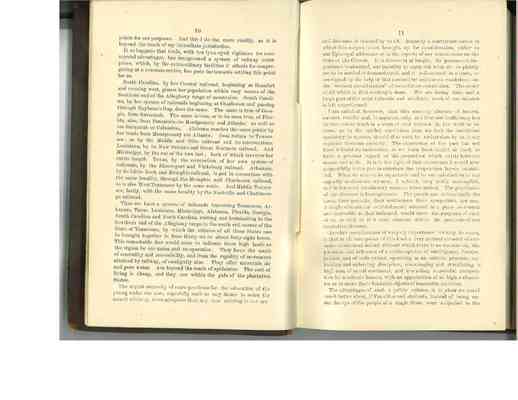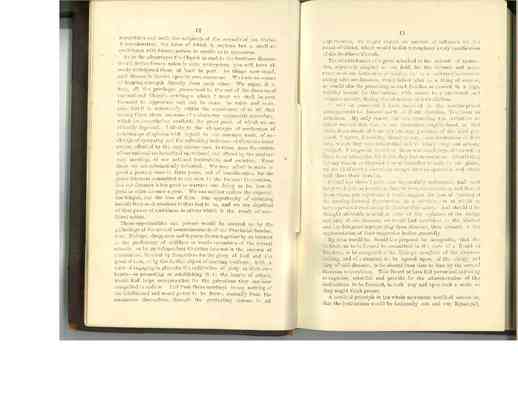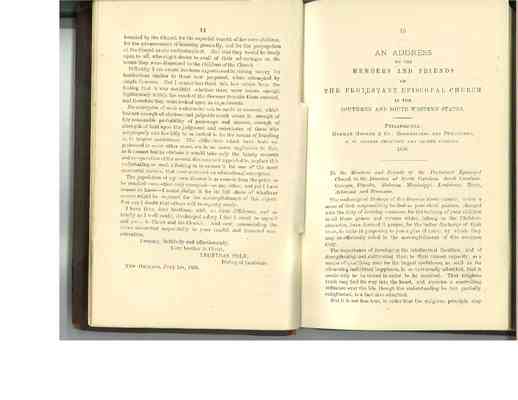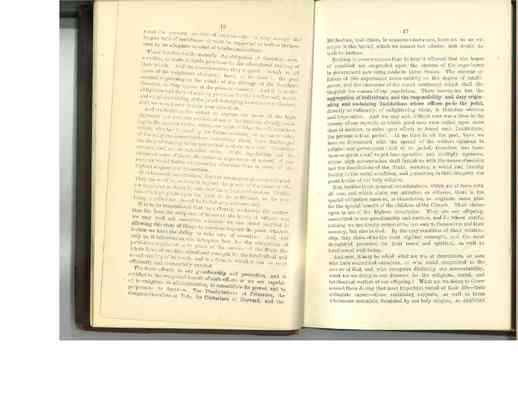Pages
6
{left page:}
10
priate for our purposes. And this I do the more readily, as it is beyond the reach of my immediate jurisdiction.
It so happens that trade, with her lynx-eyed vigilance for commercial advantages, as inaugurated a system of railway enterprises, which, by the extraordinary facilities it affords for congregating at a common centre, has gone far towards settling this point for us.
North Carolina, by her Central railroad, beginning at Beaufort and running west, places her population within easy access of the Southern end of the Alleghany {sp} range of mountains. South Caroliina, by her system of railroads beginning at Charleston and passing through Rayburn’s Gap, does the same. The same is true of Georgia, from Savannah. The same is true, or to be soon true, of Florida, also, from Pensacola via Montgomery and Atlanta; as well as via Savannah or Columbus. Alabama reaches the same points by her roads from Montgomery via Atlanta; from Selma to Tennessee; or by the Mobile and Ohio railroad and its intersections, Lousiana, by its New Orleans and Great Northern railroad. And Mississippi, by the use of tow last; both of which traverse her entire length. Texas, by the connection of her own system of railroads, by the Shreveport and Vicksburg railroad. Arkansas, by its Little Rock and Memphis railroad, is put in connection with the same locality, through the Memphis and Charleston railroad, as is also West Tennessee by the same route. And Middle Tennessee, lastly, with the same locality by the Nashville and Chattanooga railroad.
Thus we have a system of railroads traversing Tennessee, Arkansas, Texas, Louisiana, Mississippi, Alabama, Florida, Georgia, South Carolina and North Carolina, uniting and terminating in the Southern end of the Alleghany {sp} range in the south end corner of the State of Tennessee, by which the citizens of all those States can be brought together in from thirty-six to about forty-eight hours. This remarkable fact would seem to indicate these high lands as the region for our union and co-operation. They have the merit of centrality and accessibility, and from the rapidity of movement attained by railway, of contiguity also. They offer mountain air and pure water. Are beyond the reach of epidemics. The cost of living is cheap, and they are within the pale of the plantation States.
The urgent necessity of some provision for the education of the young under our care, especially such as may desire to enter the sacred ministry, more adequate than any now existing in our sev-
{right page:}
11
eral dioceses, is realized by us all. Scarcely a convention passes in which this subject is not brought up for consideration, either in our Episcopal addresses or in the reports of our conventions on the state of the Church. It is discussed at length, its paramount importance is admitted, our inability to carry out what we so plainly see to be needed is demonstrated, and it is dismissed in silence, or consigned by the help of that convenient vehicle—a resolution—to the “earnest consideration” of some future convention. The result of all which is, that nothing is done. We are losing time, and a large part of the most valuable and available work of our mission is left unperformed.
I am satisfied, however, that this seeming absence of honest, earnest, fruitful zeal, is apparent only, and that our inefficiency has its root not so much in a want of real interest in the work to be done, as in the settles conviction that we lack the conditions necessary to success, should that work be undertaken by us in our separate diocesan capacity. The experience of the past has not been without its instruction, as we have been taught at least, to have a prudent regard to the proportion which exists between means and ends. It is in the light of that experience I would now respectfully invite you to entertain the proposition herein submitted. What we cannot do separately, and to our satisfaction in our capacity as dioceses, we may, I submit, very easily accomplish, and in the most satisfactory manner when united. The population of our dioceses is homogeneous. The people are substantially the same, their pursuits, their institutions, their sympathies, are one. A single educational establishment, situated in a place so central and accessible as that indicated, would serve the purposes of each of us well as if it were situated within the precincts of our respective dioceses.
Another consideration of weighty importance inviting to union, is that in all enterprises of this kind a very natural element of success—an element indeed without which there is no success—is, the presence and influence of a public opinion of intelligence, discrimination, and of wide extent, operating as an outside pressure, upholding and enforcing discipline, encouraging and stimulating a high tone of moral sentiment, and rewarding successful competition for academic honors, with an approbation of so high a character as to make them laudable objects of honorable ambition.
The advantages of such a public opinion, it is clear we could much better show, if Faculties and students, instead of being under the eye of the people of a single State, were subjected to the
7
{left page:}
12
supervision and made the recipients of the rewards of ten States. A consideration, the force of which it requires but a small acquaintance with human nature to enable us to appreciate.
As to the advantages the Church as such in the Southern dioceses would derive from a union in such enterprises, you will have already anticipated them, at least in part. As things now stand, each diocese is thrown upon its own resources. We have no means of drawing strength directly from each other. We enjoy, it is true, all the privileges guaranteed to the rest of the dioceses of our national Church—privileges which I trust we shall be ever foremost to appreciate and last to cease to value and maintain—but it is notoriously within the experience of us all that among these, there are some of a character apparently secondary, which are nevertheless available for great good, of which we are virtually deprived. I allude to the advantages of conference, of interchange of opinion with regard to our common work, of exchange of sympathy and the refreshing influence of Christian intercourse, afforded by the easy access open to those near the centres {sp} of our national ecclesiastical operations, and offered by the anniversary of meetings of our national institutions and societies. From these we are substantially debarred. We may afford to make so great a journey once in three years, out of consideration for the grave interests committed to our care in the General Convention, but our distance is too great to warrant our doing so for less objects as often as once a year. Our opportunity of obtaining benefit from such reunions is thus lost to us, and we are deprived of that power of usefulness to others which is the result of combined action.
These opportunities and powers would be secured us by the gatherings at the annual commencements of our Provincial Seminaries. Bishops, clergymen and laymen drawn together by an interests in the proficiency of children or wards—members of the several schools—or by an independent Christian interest in the success of institutions, founded by themselves for the glory of God and the good of men, or by the further object of meeting brethren, with a view of engaging in plans for the cultivation of piety in their own hearts—or promoting or establishing it in the hearts of others, would find large compensation for the privations they are now compelled to endure. And from these meetings to say nothing of the intellectual and moral power to be drawn annually from the seminaries themselves, through the graduating classes in all
{right page:}
13
departments, we might expect an amount of influence for the cause of Christ, which would be felt throughout every ramification of the Southern Church.
The establishment of a press attached to the schools of instruction, especially adapted to our field, for the defense and maintenance of our distinctive principles, and as a medium of communicating with our dioceses, would follow after as a thing of course; as would also the presenting to such families as desired it, a high, healthy retreat for themselves, with access to a cultivated and religious society, during the education of their children.
It will be perceived I have included in the contemplated arrangements no diocese north of North Carolina, Tennessee or Arkansas. My only reason for not extending the invitation to others beyond that line in our immediate neighborhood, is, that while those South of it are without any provision of the kind proposed, Virginia, Kentucky, Missouri, etc., have institutions of their own, which they have established and in which they are already pledged. I supposed, therefore, there was small hope of interesting them in an enterprise for which they had no occasion. Should they for any reason be disposed now or hereafter to unite in our plans, we would of course cheerfully accept their co-operation and share with them their benefits.
Should the views I have thus respectfully submitted, find such favor with you as to entitle them to your consideration, and that of those whom you represent, I would suggest the time of meeting of the ensuing General Convention, as a suitable one at which to have a personal conference for further discussion. And should it be thought advisable to avail at once of the opinions of the clergy and laity of our dioceses, we would find doubtless in the clerical and lay delegates representing those dioceses, then present, a fair representation of their respective bodies generally.
My idea would be, should the proposal be acceptable, that the institutions to be formed be committed to the care of a Board of Trustees, to be composed of the Bishops ex-officio of the dioceses uniting, and of a number, to be agreed upon, of the clergy and laity of said dioceses, to be elected from time to time by the several diocesan conventions. This Board to have full power and authority to organize, establish and provide for the administration of the institutions to be founded, in such way and upon such a scale as they might think proper.
A cardinal principle in the whole movement would of course be, that the institutions would be declaredly out and out Episcopal,
8
{left page:}
14
founded by the Church for the especial benefit of her own children, for the advancement of learning generally, and for the propagation of the Gospel as she understands it. But that they would be freely open to all, who might desire to avail of their advantages on the terms they were dispensed to the children of the Church.
Difficulty I am aware has been experienced in raising money for institutions similar to those now proposed, when attempted by single dioceses. But I cannot think but that this has arisen from the feeling that it was doubtful whether there were means enough legitimately within the reach of the dioceses to make them succeed, and therefore they were looked upon as experiments.
No enterprize {sp} of such a character can be made to succeed, which has not enough of obvious and palpable merit about it, enough of fair reasonable probability of patronage and success, enough of strength of hold upon the judgment and conscience of those who are properly and lawfully to be looked to for the means of founding it, to inspire confidence. The difficulties which have been experienced in some other cases, are in no sense applicable to this, as it cannot be but obvious it would take only the hearty consent and co-operation of the several dioceses now appealed to, to place this undertaking on such a footing as to ensure it for one of the most successful careers, that ever attended an educational enterprise.
The population of my own diocese is as remote from the point to be reached—one other only excepted—as any other, and yet I have reason to know—I could pledge it for its full share of whatever means might be required for the accomplishment of this object. Nor can I doubt that others will be equally ready.
I have this, dear brethren, with no little diffidence, and as briefly as I would could, discharged a duty I feel I owed to myself and you; to Christ and his Church. And now, commending the views submitted respectfully to your candid and fraternal consideration.
I remain, faithfully and affectionately, Your brother in Christ, LEONIDAS POLK
{right page:}
15
AN ADDRESS
TO THE
MEMBERS AND FRIENDS
OF
THE PROTESTANT EPISCOPAL CHURCH
IN THE
SOUTHERN AND SOUTHWESTERN STATES
-------------------
PHILADELPHIA: HERMAN HOOKER & CO., BOOKSELLERS AND PUBLISHERS, S. W. CORNER CHESTNUT AND EIGHTH STREETS. 1856
To the Members and Friends of the Protestant Episcopal Church in the Dioceses of North Carolina, South Carolina, Georgia, Florida, Alabama, Mississippi, Louisiana, Texas, Arkansas, and Tennessee.
The undersigned Bishops of the dioceses above-named, under a sense of their responsibility to God as your chief pastors, charged wit the duty of devising measures for the training of your children in all those graces and virtues which belong to the Christian character, have deemed it proper, for the better discharge of their trust, to unite in proposing to you a plan of union, by which they may be efficiently aided in the accomplishment of this common duty.
The importance of developing the intellectual faculties, and of strengthening and cultivating them to their utmost capacity, as a means of qualifying men for the largest usefulness, as well as for advancing individual happiness, is so universally admitted, that it needs only to be stated in order to be received. That religious truth may find its way into the heart, and exercise a controlling influence over the life, though the understanding be but partially enlightened, is a fact also admitted.
But it is not less true, in order that the religious principle may
9
{left page:}
16
exert the greatest amount of control—that it may occupy the largest field of usefulness—it must be supported as well as invigorated by an adequate amount of intellectual culture.
These familiar truths underlie the obligation of Christian communities, to make suitable provision for the education training of their youth. And the considerations they suggest, through at all times of the weightiest character, have, at no time in the past, seemed so pressing on the minds of the Bishops of the Southern Dioceses, as they appear at the present moment. And it is to the obligation and duty of making provision for the intellectual, moral, and religious training of the youth belonging to our several dioceses, that we would now invoke your attention.
And we desire in the outset to express our sense of this high character and eminent services of many Institutions, already existing in the several States, where our fields of labor lie—Institutions which, whether founded by the States severally, or by one or other of the religious denominations inhabiting them, have discharged the duty of training those committed to their care with honorable claims of some of these, the personal experiences of several of our number would forbid our speaking otherwise, than in terms of the highest respect and veneration.
It is believed, nevertheless, that the whole ground is not occupied. That the work to be done is beyond the power of the laborers who are employed in doing it, and that the entrance of another Institution of a high grade upon the field to be cultivated, so far from being uncalled for, should be hailed as a welcome ally.
It is to be remembered that, as a Church, we have in this matter, thus far, been the recipients of favors at the hand of others; and we may well ask ourselves whether we can stand justified in allowing this state of things to continue beyond the point, where it is clear we have the ability to take care of ourselves. And, not only so, it behooves us also to inquire how far the obligations of patriotism require of us to place at the services of the State the whole force of our denominational strength for the intellectual and moral training of its youth, and in a form in which it can be most efficiently and successfully exerted.
The State affords us our guardianship and protection, and is entitled to the reciprocal benefit of such efforts as we are capable of, to enlighten its administration, to consolidate its power, and to perpetuate its duration. The Presbyterians at Princeton, the
{right page:}
17
Methodists, and others, in numerous instances, have set us an example in this behalf, which we cannot but admire, and would do well to imitate.
Nothing is more common than to hear it affirmed that the hopes of mankind are suspended upon the success of the experiment in government now being made in these States. The success or failure of this experiment turns entirely on the degree of intelligence, and the character of the moral sentiment which shall distinguish the masses of our population. These masses are but the aggregation of individuals, and the responsibility and duty originating and sustaining Institutions whose offices go to the point, directly or indirectly, of enlightening them, is therefore obvious and imperative. And we may add, if there ever was a time in the history of our republic at which good men were called upon more than at another, to unite upon efforts to found such Institutions, the present is that period. At no time in all the past, have we been so threatened with the spread of the wildest opinions in religion and government; and at no period, therefore, has there been so great a call to put into operation and multiply agencies, whose high conservatism shall furnish us with the means of making fast the foundations of the State, securing a sound and healthy feeling in the social condition, and preserving in their integrity the great truths of our holy religion.
But, besides these general considerations, which are of force with all men, and which claim our attention as citizens, there is the special obligation upon us, as churchmen, to originate some plan for the special benefit of the children of the Church. Their claims upon us are of the highest description. They are our offspring, committed to our guardianship and nurture, and for whose careful training we are deeply responsible, not only to themselves and their country, but also to God. By the very condition of their relationship, they claim of us the most vigilant oversight, and the most thoughtful provision for their moral and spiritual, as well as intellectual well-being.
And now, it may be asked what are we, as churchmen, as men who have committed ourselves, or who stand committed to the service of God, and who recognize distinctly our accountability, what are we doing in our dioceses for the religious, moral, and intellectual welfare of our offspring? What are we doing to throw around them during that most important period of their life—their collegiate career—those sustaining supports, as well as those wholesome restraints, furnished by our holy religion, as exhibited
10
18
{left page:}
and illustrated in the offices of the Church of their fathers? What are we doing to vindicate the claims of our Church, as, in our opinion, the most judicious mother of the young, under whose care and tuition they are least likely to fall into the snares of infidelity, or the extravagances of fanaticism, and at whose hands they are most likely to be carefully brought up in the nurture and admonition of the Lord? And especially, it may be asked, the sons of the soil, men who may preach “the unsearchabe riches of Christ” and sustain and promote with wisdom and ability the great interests of the Church of God?
Have we at all made conscience of taking those considerations into our account, when making up our plans for the education of our children? It may be all that these things have been with us, hitherto, less a matter of choice than we desired, and that we could no have gratified ourselves if we would. This apology is true, only in part. And this brings us to the consideration of the subject of this communication.
We think it must be now manifest, so far at least as our Church is concerned, that there exists within the pale of our dioceses a great Educational necessity, and a necessity to which we should forthwith take steps to supply. This necessity is the one which is common to all our dioceses alike.
In view of this condition of things, we, your Bishops, during our sojourn in this city, in attendance on the General Convention, have thought it expedient to take the matter into our serious consideration, and have come to the conclusion, it is of so pressing a character, that no time should be lost in relieveing it; and that for its relief in the most effectual manner, no plan presents itself of so promising a character, as that which would unite the energies and resources of all our dioceses in one common effort. We have therefore resolved, after mature deliberation and consultation, with leading clergymen and laymen of our several dioceses, to propose to you to unite our strength in founding an Institution upon a scale of such magnitude, as shall answer to all our wants. This we propose shall be a University, with all the Faculties—theology included-upon a plan so extensive, as to comprise the whole course usually embraced in the most approved Institutions of that grade, whether at home or abroad.
We are aware of the magnitude of such an enterprise, in all its aspects—the large amount of capital necessary for its foundation, and the very weighty responsibility resting upon those who shall
19
{right page:}
be charged with the duty of shaping its plans and conducting them to a successful consummation. But when we think of the pervading and far reaching influences such an Institution could not but have upon the interests of the country and the Church, and reflect on the extent of the field which we propose to draw, not only the means for its establishment, but the minds to found and govern it, we dare not hesitate to believe that all the resources necessary, of whatever description, are within our reach, and will be forthcoming so soon as they shall be needed. To say nothing of the well known and ample wealth belonging to our communion generally, we will not allow ourselves to believe that upon the presentation of such an occasion for the employment of a part of that treasure committed to our stewardship, we shall fail to find our Lawrences and Stuyvesants, our Moores, and Kohnes, and Gores, and Dudlys, ready to lend their aid in the consummation of so great a work.
In submitting this programme for your consideration, we have deemed it proper to add a few particulars, which we have thought it expedient to incorporate in our plan of operation.
1st. That the University should, in all its parts be under the sole and perpetual direction of the Protestant Episcopal Church, as represented by the dioceses, as indispensable to its success.
2d. That the Board of Trustees should be composed of the Bishops of the dioceses, ex-officio, so uniting, and one clergyman and two laymen from each of the said dioceses to be elected by the Conventions of the same. The joint consent of the Bishops, as an order, and of the clerical and lay trustees, shall be necessary to the adoption of any measure proposed.
3d. That the sum of $500,000 shall be the least amount with which the enterprise shall be commenced.
4th That there should be a Treasurer appointed in each diocese to whom shall be paid the sums subscribed in that diocese, whose duty it shall be to vest those sums in unquestionable public securities, paying over annually to the Treasurer of the Corporation, the interest of the amount subscribed.
5th. That there should be a Treasurer of the Corporation, who should receive the interest annually from the diocesan Treasurer, and expand it under the direction of the Board of Trustees.
6th. That the amount subscribed by any diocese, and secured as above, should revert to the diocese subscribing it, in case of the dissolution of the Association.
7th. That each Bishop shall bring the subject specifically before his diocese and Convention, and shall also put into operation any agencies he may think best for promoting the cause, in accordance with the general principles here laid down.
8th. That the Senior Bishop by consecration, of the Association, shall always be Chancellor of the University.
9th. It is deemed expedient to establish the University at some




